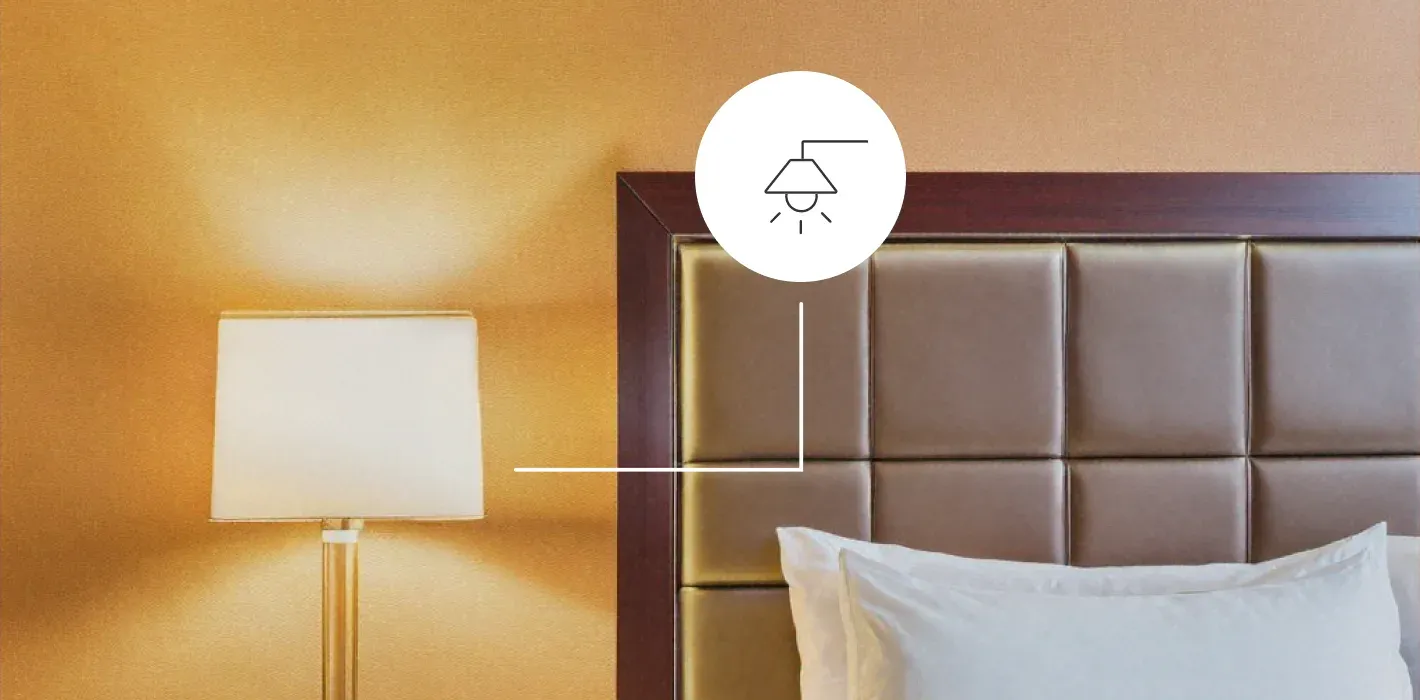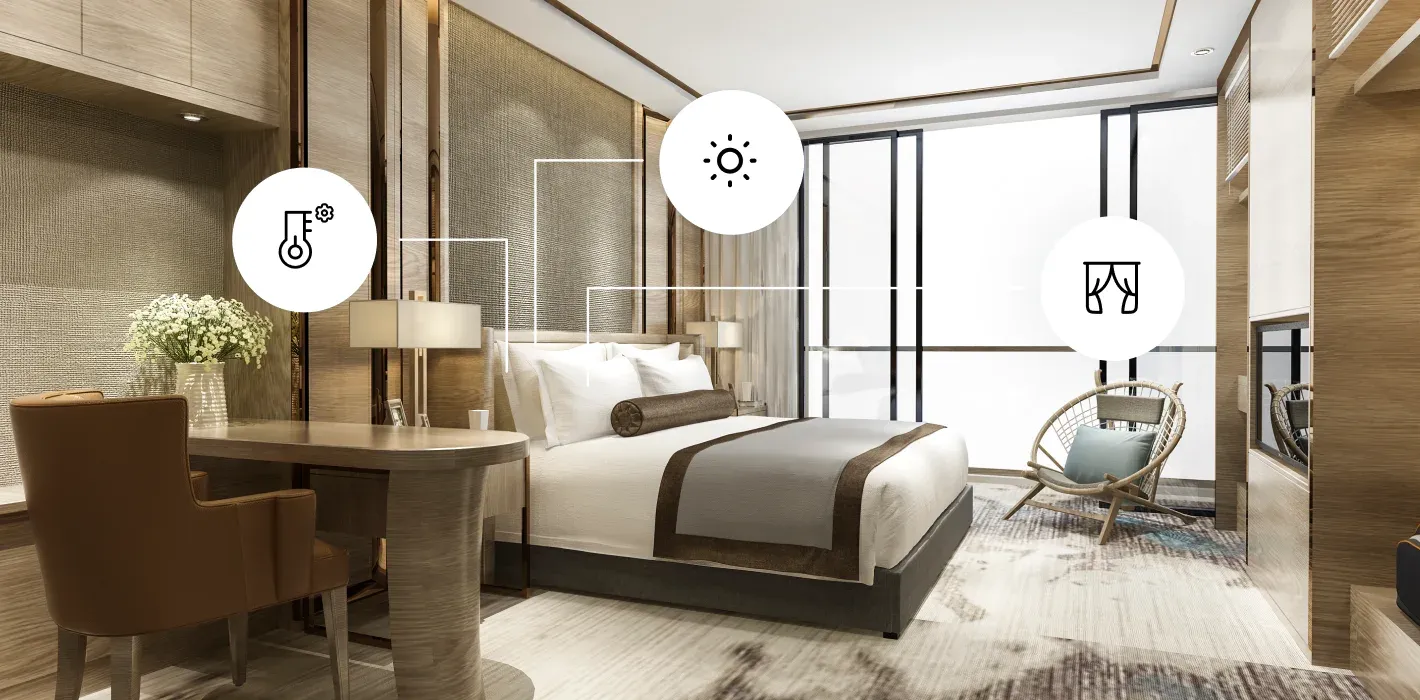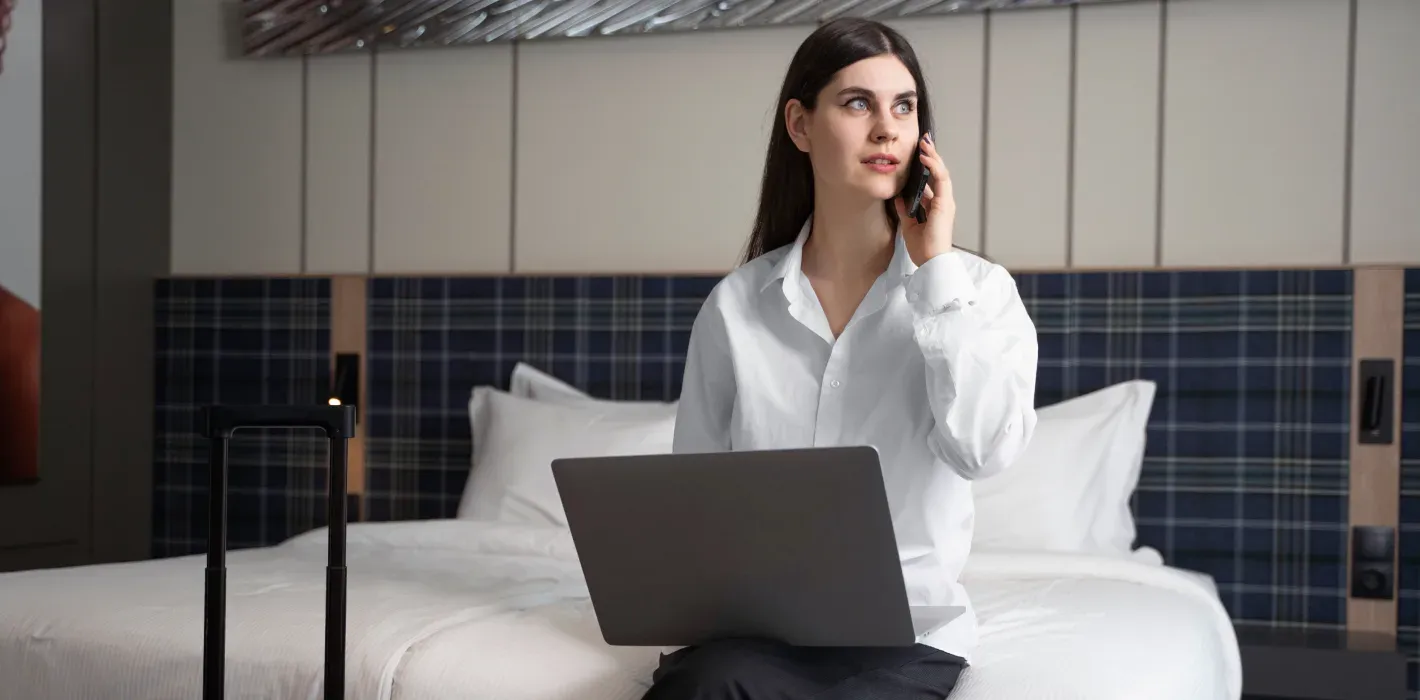

The hotel industry is constantly evolving, and 2026 will bring significant changes to how resorts, hotels, and other lodging facilities operate. From modern digital technologies to eco-friendly initiatives, how hotel businesses engage with guests and optimize their operations is transforming.
In this article, we'll explore the seven major hospitality industry trends for 2026 and how your hotel can use these shifts to maintain a competitive edge.

With guests seeking both convenience and security, contactless solutions have become key components of modern hospitality industry trends.
Innovations such as keyless access, smartphone payments, and contactless check-in enhance the guest experience while streamlining hotel operations.
Guests can skip the front desk entirely and check in, unlock rooms, and access hotel facilities directly from their smartphones. This approach not only saves time for guests but also reduces staff workloads, allowing them to focus on personalized services.
Additionally, contactless payment systems improve both security and operational efficiency. As mobile payments and digital wallets become more popular, offering these options will meet guest expectations and set your hotel apart from competitors in the evolving hospitality industry.
Benefit: Contactless technology boosts guest satisfaction, loyalty, and operational efficiency—all while keeping your hotel competitive.
Smart rooms and in-room technology have become essential for hotel managers. Beyond luxury, today’s guests expect a technologically advanced experience that ensures seamless control, personalization, and user-friendliness.
 Guests can now use devices to control their room’s entertainment, temperature, and lighting, creating a more personalized stay. Hotel smart room technology also improves energy efficiency with occupancy-based settings that adjust automatically when rooms are unoccupied.
Guests can now use devices to control their room’s entertainment, temperature, and lighting, creating a more personalized stay. Hotel smart room technology also improves energy efficiency with occupancy-based settings that adjust automatically when rooms are unoccupied.
Modern establishments are adopting hotel technology trends like smart rooms, which include voice-activated controls and integrated systems. These features provide guests with an elevated experience by simplifying tasks such as adjusting room conditions and accessing hotel services.
Incorporating hotel room technology, such as guest messaging systems and automation, can further boost satisfaction.
Benefit: By reducing energy consumption when rooms are vacant, hotels can increase cost savings and improve sustainability. Embracing these hotel industry trends is crucial for offering operational efficiency and personalized services.
Sustainability has become a key component of the latest hospitality trends, going beyond just a buzzword. Hotel owners aiming to meet guest expectations and legal requirements must prioritize eco-friendly practices.
Today's guests are more environmentally conscious, choosing accommodations that prioritize sustainability. Adopting green hotel trends can help your business reduce environmental impact and attract eco-conscious travelers.
Implementing green technology in the hospitality industry can significantly lower water and energy usage. Energy-efficient lighting, automated climate control systems, and water-saving fixtures can reduce operational costs while shrinking your hotel's carbon footprint.
Additionally, offering recycling programs and replacing single-use plastics with sustainable alternatives can help minimize waste. Sourcing locally produced, sustainable ingredients for your dining options and spa treatments further enhances your hotel's eco-friendly appeal.
Benefit: Embracing sustainability in the hotel industry not only benefits the environment but also resonates with the values of modern guests.
You can no longer rely on conventional services since modern guests want experiences catered to their requirements, interests, and preferences.
Integrating modern technology in the hospitality industry and data can enable you to deliver a customized experience for each guest, increasing loyalty and satisfaction. Personalization begins the moment a guest checks in.
Booking systems and hotel customer relationship management (CRM) tools effectively gather valuable information on guest preferences, such as room type and dietary needs. This data can be used to recommend activities, offer personalized promotions based on previous visits, or present unique room configurations that suit their preferences.
Benefit: Smart room technology allows for automatic adjustments to temperature and lighting, while guests can enjoy in-room guest entertainment from their smart TVs. Incorporating these features ensures your hotel provides a memorable, tailored experience.
To get all of these benefits, contact HotelSmarters.
Wellness has become a top priority for guests, and hotels must focus on meeting these needs. Modern travelers seek more than just a place to stay—they want environments where they can relax, recharge, and improve their overall well-being.
Incorporating wellness-focused activities into your offerings is a hospitality industry trend you can’t afford to ignore.
In fact, today's wellness hotel trends go beyond traditional spa treatments and fitness programs. Guests seek comprehensive wellness experiences, including healthy dining options, mental health services, and fitness activities.
You can offer services such as in-room yoga or meditation classes, wellness-centered menus featuring organic and locally sourced ingredients, and outdoor fitness programs like morning runs or guided hikes. These services enhance the guest experience by supporting their physical and mental well-being during their stay.
Another effective strategy is integrating wellness into your hotel’s design. Calm interiors, natural lighting, and advanced air filtration systems help create a tranquil environment that promotes relaxation and improves sleep quality.
 As remote and hybrid work grows, providing comfortable accommodations for business travelers has become essential. For hotel owners, this presents an opportunity to cater to the increasing demand by creating spaces and amenities that support work and relaxation.
As remote and hybrid work grows, providing comfortable accommodations for business travelers has become essential. For hotel owners, this presents an opportunity to cater to the increasing demand by creating spaces and amenities that support work and relaxation.
Today’s business guests seek flexible environments that seamlessly transition between work and leisure. By offering well-designed workspaces, your hotel can become the preferred choice.
Ensure your property has fast, reliable WiFi throughout—whether in guest rooms, common areas, or conference rooms. Poor connectivity is a frustration for remote workers, making dependable internet infrastructure critical.
Additionally, consider creating dedicated workspaces like quiet lounges, shared co-working spaces, or in-room setups with comfortable seating, plenty of lighting, and easy access to charging stations. These amenities will greatly enhance your guests' working experience and position your hotel as a go-to option for remote workers.
Similarly, most hybrid employees appreciate adaptable meeting spaces. With conference rooms including smart TVs, soundproofing, and video conference capabilities, your hotel might become a hub for personal and group business.
To capitalize on this trend in the hospitality industry, you could offer "workcation" packages—that is, cheaper prices for longer stays—for guests who require a longer-term workspace. Along with desks, think about including facilities that improve the health and well-being of remote workers, such as fitness centers, healthy food alternatives, and outdoor leisure places.
By automating repetitive tasks, automation and artificial intelligence (AI) allow hotel staff to focus on delivering more personalized guest experiences, improving overall service quality.
One significant use of AI is through virtual assistants and chatbots. These AI-driven systems can handle guest inquiries, confirm bookings, process room service requests, and even provide personalized recommendations.
Automation also reduces the front desk staff’s workload, allowing faster responses to guest needs and improving communication. This streamlined approach enhances the handling of common guest questions, ensuring a smoother, more efficient stay.
On the back end, automation in hospitality industry processes improves inventory management, demand forecasting, and pricing strategies through data analysis.
Automated housekeeping schedules and sensors that track guest departures enable timely room cleaning, while AI can predict maintenance needs and peak times to further increase operational efficiency.
Benefit: The guest experience is elevated with AI and automation through personalized services. From custom check-ins to keyless room access, these technologies cater to guest preferences.
The Role of Digital Entertainment in Guest Engagement
Digital entertainment changes the game when it comes to keeping guests engaged. Today’s guests expect more than just a standard TV in their room. They want access to the same convenience and personalization they enjoy at home. By providing modern hotel in-room entertainment, you can elevate their stay and encourage them to return.
In the hospitality industry, digital entertainment is all about personalized content, modern TVs, and access to popular streaming platforms. Guests want to be able to stream their favorite services—like Hulu and Netflix—whenever they want. Upgrading your in-room entertainment systems to include these options lets guests feel at home.
Interactive features, like ordering room service or adjusting the room settings through the TV, can also take their experience to the next level. But to pull this off, you need a reliable system that integrates smoothly with what you already have.
That’s where HotelSmarters comes in.
With our modern end-to-end smart TV solutions designed specifically for the hospitality industry, your guests can easily stream content, mirror their devices to the TV, and access hotel services all in one place.
There’s so much more you can provide your guests with. Contact us to not miss out on your hospitality business growth opportunities.
In 2026, the hospitality trends are being reshaped by technological advances, a focus on sustainability, and the evolving preferences of Generation Z and Millennials. Hotel owners can maintain a competitive edge by embracing trends like eco-friendly practices, personalized guest experiences, contactless technology, and smart room solutions.
These hotel industry trends do much more than improve guest satisfaction. They also improve your hotel’s operational efficiency, positioning it as a forward-thinking destination.
Are you prepared to stay ahead of the latest hospitality trends? Click here!
Considering the growing hospitality trends for customized experiences and integrated digital services, the main difficulty is adjusting to the rapid pace of technology development and changing guest expectations.
Millennials view real cultural involvement and customized experiences motivated by technology as top priorities, along with sustainability. They often prioritize the presence of smart room controls, smartphone check-ins, and sustainable practices in a hotel.
Highlighting the value of digital interactions, fast WiFi, and social media involvement, Gen Z is driving the hotel sector towards technological improvement.
While also appreciating simple, mobile-first solutions like digital entertainment alternatives and contactless payment methods, they have strong ethical standards, especially in sustainability and diversity, which are top priorities.
Co-founder / CTO
Armen is the CTO and Co-Founder of inoRain OTT and Co-Founder of HotelSmarters, specializing in advanced streaming technologies, OTT strategy, and interactive TV systems. He builds scalable end-to-end video delivery solutions and drives technical innovation across hospitality and streaming platforms, bridging complex engineering with practical business impact.